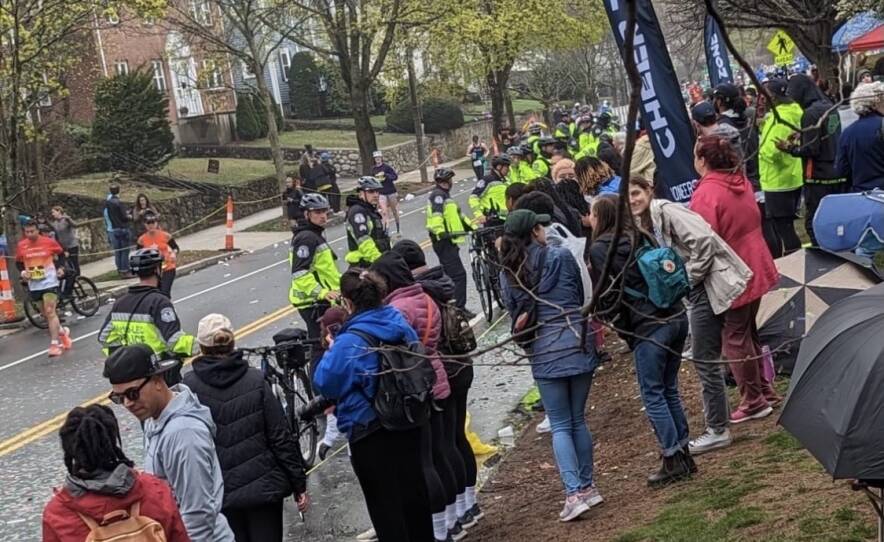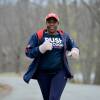Updated at 1:53 p.m. April 20
At mile 21 of the Boston Marathon, the PIONEERS Run Crew and TrailblazHers Run Co. celebrated on Monday as each of their friends running in the race passed by.
The two groups, who share a mission of spreading a love of running within communities of color, had set up a tent on Heartbreak Hill in Newton. For hours, they fired confetti cannons and stepped over a rope barrier to run alongside their friends, carrying banners with the running clubs' names.
"We were having so much fun," said Mike Remy of PIONEERS Run Crew. "And that all kind of came to an abrupt stop."
Police officers arrived at mile 21 and formed a barrier between the groups and the athletes running past, as well as stood on the street behind the cheer section. Newton Police have characterized the response as a respectful effort to keep runners and spectators safe after receiving complaints, but members of the running clubs say it was heavy-handed, disproportionate to police response elsewhere along the marathon route, and the result of systemic racism.
The Boston Athletic Association, which runs the marathon, agreed to meet with the running groups Wednesday evening to discuss what happened. On Thursday, the BAA released a statement expressing regret.
"It is our job, and we need to do better to create an environment that is welcoming and supportive of the BIPOC communities at the marathon," the statement read .
It's a tradition for the PIONEERS Run Crew to run alongside members who are competing in a marathon, said one of the group's captains, Aliese Lash.
"In Chicago, in D.C., in New York, even in Berlin, we have this sort of moment of tradition of celebration," Lash said.
Videos from Monday's race in Boston show groups of several spectators from the group running on the marathon with banners. But then, one of the crew leaders was approached by police as he got ready to greet a runner, Lash said.
"An officer came up to him and grabbed him and pushed him into the crowd and said, 'Sir, let me see your I.D.,'" Lash recalled.
She said the officer then threatened to arrest the crew leader if he came on the course again.
"And so we said, 'All right, like if we're not allowed to be on the course, we'll just stand behind the line like everyone else,'" Lash said. "And then shortly after that, there was a line of bike police who created a barrier between our group and the runners."
Photos and videos of the moment show about a dozen police officers with bikes lined up along Commonwealth Avenue, facing the spectators in the two running clubs, as members of the groups questioned why they're there.

Newton Police Chief John Carmichael said in a written statement that the police responded to a complaint from the Boston Athletic Association.
"After being notified by the B.A.A three times about spectators traversing the rope barrier and impeding runners, the Newton Police Department responded respectfully and repeatedly requested that spectators stay behind the rope and not encroach onto the course," the Newton police chief wrote. "When spectators continued to cross the rope, NPD with additional officers calmly used bicycles for a short period to demarcate the course and keep both the runners and spectators safe."
When asked for a response to the incident, the Boston Athletic Association released a statement that read, in its entirety, "The B.A.A. is committed to creating a safe and enjoyable experience for athletes, volunteers and spectators across all our events.”
"Our cheer zone was packed with runners and other athletes," said Mike Remy of PIONEERS Run Crew. "So we wouldn't dream of doing something to impede somebody on the course."
For Remy and others in the group, the scene was shaped by its racial dynamics.
"All I'm left with is, here is a cheering area primarily of Black and brown and Latin folk, and that's where we are being heavily policed," Remy said. "I didn't see or hear any reports of things like that coming out of Wellesley, coming out of B.C. And having experienced those cheer zones in the past, I know what goes down there. You know, people there are drinking and boozing and real hard. People are crossing the street."
And, he said, people on the sidelines often jump onto the course to run with friends and family who are competing.
"If it's going to be a hard and fast rule, then say it's a hard and fast rule, but enforce it everywhere."
For Aliese Lash, there was a clear explanation for what she saw as a disproportionate response.
"I mean, my answer is systemic racism," Lash said. "People seeing people who they're not used to showing up in their neighborhoods automatically jumping to biases and assumption that we're unsafe, that we're here to harm somebody, that we're drug dealers — whatever people say or think about when they see us. That is deeply embedded, and that's embedded in our culture, every corner of our culture."
Issues of racism are not new in the running world, Lash said, and the PIONEERS Run Crew exists to help runners of color find a place where they can feel included. Those issues are also why Lash serves on the steering committee for the Boston Running Collaborative , a BAA diversity initiative.
"I'm a part of that group because they're committed to thinking about how we can make running more equitable and accessible to people of color," she said. "And they share stories about how they want us to feel like we belong here, like we're welcome. But I also know that the Boston Marathon itself is a historically exclusive event that is incredibly difficult for people to enter in the first place, [and] that runs through the wealthy white suburbs of the city. And to us, especially us who are from Boston, we have to leave our city to come to Newton and then to be met with not feeling welcome, not feeling safe. It's so disappointing."
The BAA has agreed to meet with leaders of the PIONEERS Run Crew and TrailblazHers Run Co. this evening to discuss the incident, Lash said.
"We have to be true to what's happening in our larger society. And this is just a representation of that," said Tiffany Chenault, a sociology professor at Salem State University and an ambassador for the Boston chapter of the running group Black Girls Run. Chenault also serves on the Boston Running Collaborative .
Chenault, who was not at mile 21 on Monday, said the larger issue of systemic racism is a problem in the running world, and she'd like to see the BAA take more steps to address it.
"I hope that they call it out," Chenault said. "I hope that they put mechanisms in place, because the BAA is such a powerful organization, and that they take a stand on this," she said. "So I'd be interested to see what they say and then what would they do moving forward. Because this puts a bad taste in many people's mouth."
This story was updated to include a quote from the BAA's statement released Thursday.








